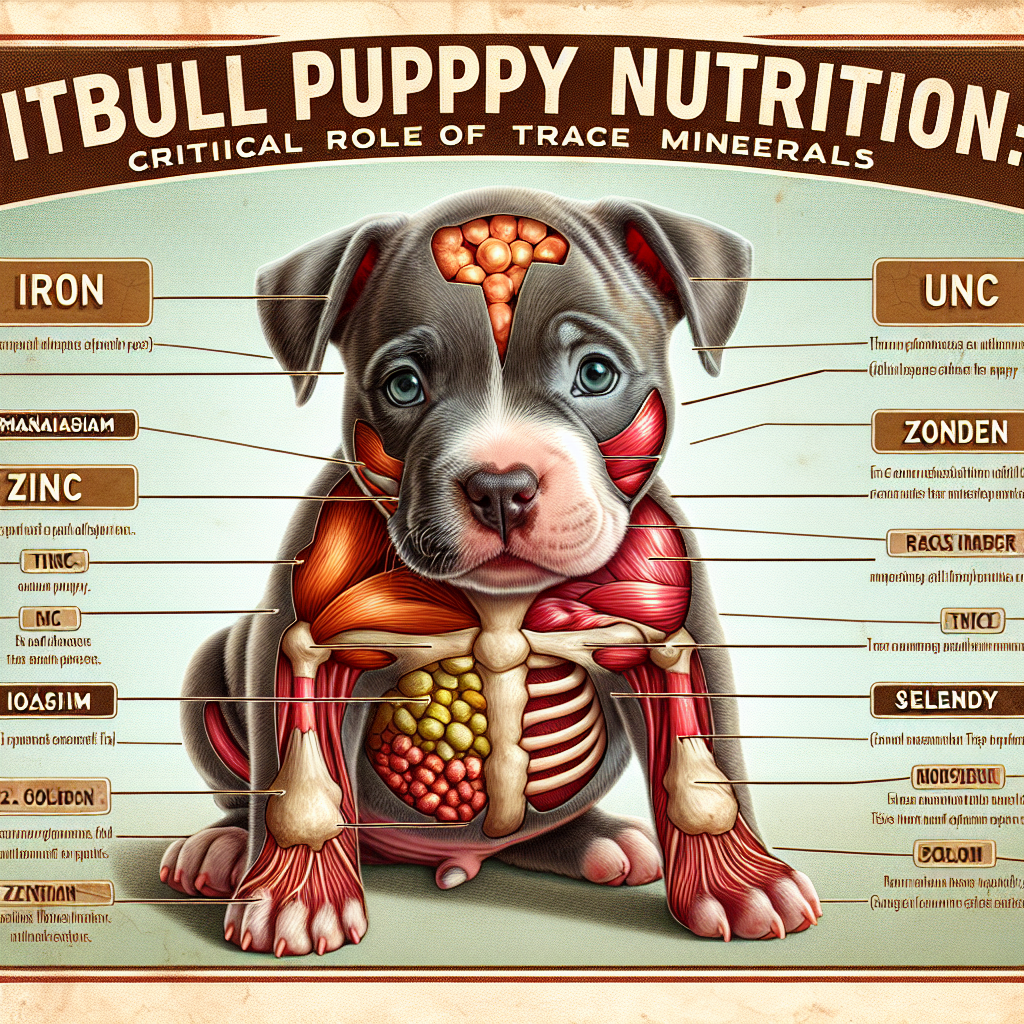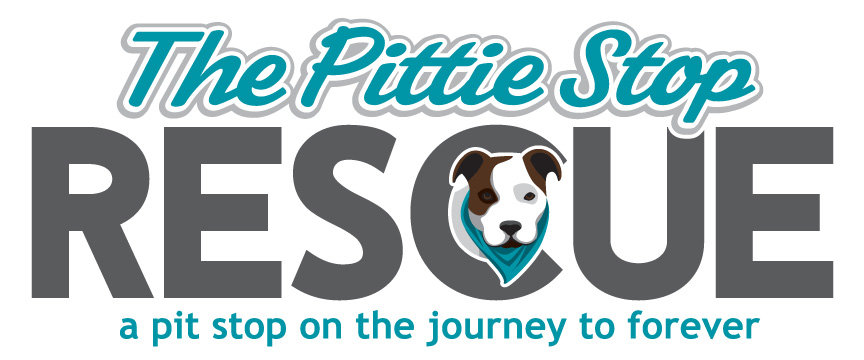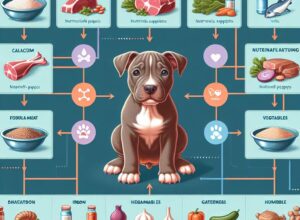
Pitbull Puppy Nutrition: Critical Role of Trace Minerals
Article-at-a-Glance
- Discover why trace minerals are a game-changer for your pitbull puppy’s growth and health.
- Learn about the essential nutrients that your growing pitbull puppy needs.
- Understand the impact of trace minerals on your puppy’s development.
- Find out how to ensure your pitbull puppy’s diet is rich in crucial trace minerals.
- Get tips on reading food labels to choose the best nutrition for your pitbull puppy.
The Foundation of Pitbull Puppy Health
When it comes to raising a healthy pitbull puppy, nutrition is the cornerstone. Just like a young athlete needs the right fuel to grow and perform, your pitbull puppy requires a balanced diet to develop strong bones, a robust immune system, and a vibrant coat. It’s not just about feeding them enough; it’s about feeding them right.
Why Nutrition Matters for Pitbull Puppies
Every bite your pitbull puppy takes can either contribute to their health or detract from it. Proper nutrition supports their rapid growth phase, helps prevent disease, and lays the groundwork for a long, happy life. Without the right nutrients, your puppy could face developmental delays and health issues that could follow them into adulthood.
But what exactly does ‘proper nutrition’ mean? It’s a diet that meets all their needs: proteins for muscle growth, fats for energy, carbohydrates for fuel, vitamins for biochemical functions, and minerals for everything from nerve conduction to oxygen transport.
Overview of Essential Nutrients for Growth
Let’s break down these essentials:
- Proteins: The building blocks of muscles and organs.
- Fats: Essential for energy and the absorption of certain vitamins.
- Carbohydrates: Provide fuel and help with digestion.
- Vitamins: Necessary for immune function and overall health.
- Minerals: Crucial for bone health, nerve function, and many other processes.
While all these nutrients are important, minerals often don’t get the spotlight they deserve. Yet, they’re vital for your pitbull puppy’s health and development.
Zooming in on Trace Minerals
Trace minerals are needed in smaller amounts than major minerals, but their impact on your pitbull puppy’s health is anything but small. They’re involved in a multitude of bodily functions, from building strong bones to regulating metabolism.
These tiny nutritional powerhouses play a significant role in ensuring that your pitbull puppy grows up to be a strong, healthy dog. They’re called ‘trace’ because your pup only needs them in trace amounts, but without them, their health could be compromised.
So, let’s get to the heart of the matter and talk about these tiny but mighty minerals.
Defining Trace Minerals
Trace minerals are a group of minerals that are essential for life, yet only required by the body in minuscule amounts. Despite their small dosage, they are powerhouses when it comes to your pitbull puppy’s health, influencing everything from enzyme function to hormone production. Think of them as the behind-the-scenes workers that keep your puppy’s body running smoothly.
The Must-Have Trace Minerals for Pitbull Puppies
Your pitbull puppy’s diet should include several key trace minerals:
- Iron: Essential for healthy blood and oxygen transport.
- Zinc: Supports immune function and skin health.
- Copper: Important for heart health and developing connective tissue.
- Manganese: Aids in bone formation and metabolic processes.
- Selenium: Works as an antioxidant, protecting body cells from damage.
- Iodine: Crucial for thyroid function, which regulates growth and metabolism.
Each of these minerals supports your puppy’s body in unique ways, and a deficiency in any one of them can lead to health issues.
Investigating the Impact of Trace Minerals
Trace minerals might be tiny, but their impact on your pitbull puppy’s growth and development is immense. They work in synergy, meaning they often team up to enhance each other’s effects. For instance, iron helps transport oxygen in the blood, while copper works with iron to form red blood cells.
Benefits of Trace Minerals on Development
Here’s how these trace minerals benefit your pitbull puppy:
- Iron: Prevents anemia and promotes vigor and energy.
- Zinc: Ensures proper growth and aids in healing.
- Copper: Keeps fur shiny and supports a healthy heart.
- Manganese: Helps with joint health and prevents bone malformations.
- Selenium: Bolsters the immune system and shields against oxidative stress.
- Iodine: Regulates growth and development through thyroid hormone production.
When these minerals are present in the right amounts, your puppy can grow up strong and healthy, with fewer risks of developmental problems.
Identifying Signs of Deficiencies
Spotting a trace mineral deficiency can be tricky, but there are signs you can look out for:
- Unusual fatigue or lethargy could indicate an iron deficiency.
- Poor growth or delayed healing might be a sign of low zinc levels.
- A dull coat or skin issues could suggest a copper deficiency.
- Lameness or skeletal problems may be due to a lack of manganese.
- If your puppy seems prone to illness, they might be low in selenium.
- And if your puppy’s growth seems stunted, they may not be getting enough iodine.
Being aware of these signs can help you catch a potential deficiency early and adjust your puppy’s diet accordingly.

Trace Minerals in Your Pitbull Puppy’s Diet
Ensuring that your pitbull puppy gets the right amount of trace minerals can seem daunting, but it’s all about the quality of the food you choose. A well-balanced, high-quality puppy food should provide all the trace minerals your growing pitbull needs.
When selecting food for your puppy, look for brands that list these minerals in their ingredients. Remember, the source of the minerals matters as well; chelated minerals, for example, are more easily absorbed by your puppy’s body.
Sourcing the Right Food
Finding the right food for your pitbull puppy is like picking the perfect pair of shoes; it needs to fit just right. Look for puppy food that’s specifically formulated for large breeds like pitbulls. These foods have the right balance of nutrients to support their rapid growth without overdoing it on calories.
- Check for a statement from the Association of American Feed Control Officials (AAFCO) on the packaging, ensuring it’s complete and balanced.
- Opt for brands that use whole food ingredients over by-products and fillers.
- Ensure the food includes a variety of trace minerals, ideally listed as chelated or proteinated for better absorption.
- Consider brands that have undergone feeding trials, which means the food has been tested on real dogs to confirm its nutritional adequacy.
Remember, the best food for your puppy is one that supports their overall health and growth, including those essential trace minerals.
Understanding Food Labels and Trace Mineral Content
Deciphering food labels can feel like cracking a secret code, but once you know what to look for, it’s a breeze. The ingredient list is your go-to section for understanding what’s in your puppy’s food, including trace minerals.
- Ingredients are listed by weight, so look for trace minerals towards the end of the list.
- Seek out foods where minerals are listed in an easily absorbable form, like ‘zinc proteinate’ instead of just ‘zinc’.
- Be wary of vague terms like ‘mineral supplements’ without specific names attached.
- Check the guaranteed analysis section for the minimum and maximum levels of key nutrients.
With a little practice, you’ll be a pro at picking out the best food options for your pitbull puppy’s mineral needs.
Feeding Your Pitbull Puppy for Optimal Health
Feeding your pitbull puppy isn’t just about filling their bowl; it’s about nurturing their body. The right diet sets the stage for a lifetime of health and happiness.
Calculated Meal Planning with Trace Minerals
Meal planning for your pitbull puppy should be as tailored as a custom suit. It’s not just about the right amount of food, but also the right balance of nutrients, including trace minerals. Start with the feeding guidelines on your puppy food, but be ready to adjust based on your pup’s individual needs.
- Monitor your puppy’s weight and growth; they should be growing steadily, but not too fast.
- Keep an eye on their energy levels and the condition of their coat, both indicators of good health.
- Adjust portions if your puppy seems too thin or a bit chubby, but always maintain a balance of nutrients.
- Consult with your vet to ensure your meal plan meets your pitbull puppy’s specific needs.
Remember, every puppy is unique, and their diet should reflect that.
Supplements vs. Natural Food Sources
When it comes to trace minerals, is it better to supplement or stick to what’s in the food? The answer is, it depends. High-quality puppy food should provide everything your pitbull needs. However, if your vet identifies a deficiency, supplements can help bridge the gap.
- Always choose a supplement designed for dogs, as human supplements may contain harmful ingredients for pups.
- Look for supplements that are specifically formulated for puppies, taking into account their growth needs.
- Consult with your vet before adding any supplements to your puppy’s diet to avoid over-supplementation.
- Remember, more isn’t always better; stick to the recommended doses to keep your puppy safe.
Food first, supplements second — that’s the mantra for a well-fed pitbull puppy.
Tailored Nutrition for Your Pitbull Puppy’s Needs
Just like kids, every pitbull puppy is different. Some may be couch potatoes, while others are little balls of energy. Their diet needs to match their lifestyle and growth rate.
- Active puppies may need more calories, but it’s still important to keep the balance of nutrients.
- For puppies that are growing a bit too quickly, a diet lower in fat and calories might be necessary to prevent joint issues.
- If your puppy has a sensitive stomach, look for foods with limited ingredients and high digestibility.
- Always keep fresh water available, as hydration is just as important as nutrition.
By paying attention to your pitbull puppy’s individual needs, you can tailor their nutrition for optimal health, ensuring they get the best start in life.
Adjusting Diets for Different Growth Stages
Just like a child needs different clothes as they grow, your pitbull puppy’s diet needs to change as they move through different growth stages. From the weaning phase to the rambunctious teenage months, each stage has its own nutritional demands.
- Weaning Puppies (6-8 weeks old): Focus on a diet that’s easy to digest and rich in proteins and fats to support their rapid development.
- Young Puppies (2-6 months old): This is the time for steady growth. Ensure their diet is balanced with the right amount of trace minerals to support bone and muscle development.
- Older Puppies (6-12 months old): As growth starts to slow, adjust their diet to prevent excessive weight gain while still supporting their development.
- Adolescent Puppies (12-18 months old): For pitbulls, this is when they start to fill out. Keep an eye on their body condition and adjust their food intake accordingly.
Remember, the transition between stages should be gradual to avoid upsetting your puppy’s stomach. And always consult with your vet if you’re unsure about dietary changes.
Special Considerations for Active and Athletic Puppies
For those pitbull puppies that never seem to run out of energy, their diets need to fuel their activity levels. Active and athletic puppies burn through calories faster and require more energy from their food.
- Increased Protein: Helps repair and build muscle tissue for those pups who love to play and exercise.
- More Calories: Active puppies may need a higher calorie intake to match their energy expenditure.
- Essential Fatty Acids: Omega-3 and Omega-6 are important for joint health, especially for puppies that are always on the move.
- Hydration: Always ensure they have access to fresh water, especially after exercise or playtime.
But be careful not to overfeed. Even active puppies can gain too much weight, which can lead to joint problems later in life. It’s all about finding the right balance for your energetic friend.
Frequently Asked Questions (FAQ)
What are the most important trace minerals for pitbull puppies?
The most important trace minerals for pitbull puppies include iron, zinc, copper, manganese, selenium, and iodine. Each plays a unique role in your puppy’s health, from supporting red blood cell production to ensuring proper growth and development.
How can I tell if my pitbull puppy is getting enough trace minerals?
It’s all about observation. Watch for signs of good health: a shiny coat, clear eyes, consistent growth, and lots of energy. If your puppy seems off, lacks energy, or has a dull coat, it might be time to evaluate their diet. Your vet can also perform tests to check for any deficiencies.
Can I give my pitbull puppy human vitamin and mineral supplements?
No, it’s not recommended to give your pitbull puppy human supplements. Dogs have different nutritional needs, and some human supplements can be harmful to them. Always choose supplements specifically formulated for dogs and consult with your vet before adding anything new to your puppy’s diet.
Do all puppy foods contain the necessary trace minerals for my pitbull?
Not all puppy foods are created equal. While many commercial foods claim to be ‘complete and balanced,’ the quality and quantity of trace minerals they contain can vary significantly. Some brands may skimp on these essential nutrients to save on costs. It’s vital to choose a high-quality puppy food that lists specific trace minerals in their ingredients, ensuring your pitbull gets what they need for optimal health.
When shopping for your puppy’s food, always look for the AAFCO statement of nutritional adequacy and consider foods that have undergone feeding trials. This way, you can be more confident that the food will meet your growing pitbull’s nutritional needs.
How do I change my pitbull puppy’s diet if I suspect a mineral deficiency?
If you suspect your pitbull puppy isn’t getting enough trace minerals, the first step is to consult with your veterinarian. They can perform tests to confirm any deficiencies and recommend a dietary plan tailored to your puppy’s needs. If a change in diet is necessary, here’s how to make the transition smooth:
- Introduce the new food gradually by mixing it with the current food, slowly increasing the proportion over a week.
- Watch your puppy’s reaction to the new diet, including their energy levels, stool consistency, and overall demeanor.
- Ensure the new food includes a comprehensive list of trace minerals in absorbable forms.
- Be patient and consistent. Dietary changes can take time to show results.
Remember, abrupt changes to your puppy’s diet can cause digestive upset, so take it slow and steady



